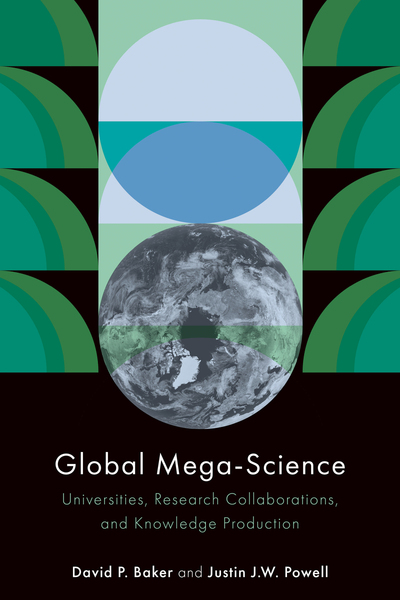
April 2024
254 pages.
from $30.00
Paperback now $15.00 (50% off)
Hardcover ISBN: 9781503602052
Paperback ISBN: 9781503637894
Ebook ISBN: 9781503639102
Never has the world been as rich in scientific knowledge as it is today. But what are its main sources? In accessible and engaging fashion, Global Mega-Science examines the origins of this unprecedented growth of knowledge production over the past hundred and twenty years. David P. Baker and Justin J.W. Powell integrate sociological and historical approaches with unique scientometric data to argue that at the heart of this phenomenon is the unparalleled cultural success of universities and their connection to science: the university-science model. Considering why science is so deeply linked to (higher) educational development, the authors analyze the accumulation of capacity to produce research—and demonstrate how the university facilitates the emerging knowledge society.
The age of global mega-science was built on the symbiotic relationship between higher education and science, especially the worldwide research collaborations among networked university-based scientists. These relationships are key for scholars and citizens to understand the past, future, and sustainability of science.
About the authors
David P. Baker is Professor of Sociology, Education, and Demography at Pennsylvania State University and the 2023-24 George Sarton Chair for the History of Science at Ghent University, Belgium. He is the author of The Schooled Society (Stanford, 2014) and co-author of National Differences, Global Similarities (Stanford, 2005) and The Century of Science (2017).
Justin J.W. Powell is Professor of Sociology of Education at the University of Luxembourg. His (co-)authored books include Comparing Special Education (Stanford, 2011), Barriers to Inclusion (2016), and The Century of Science (2017).
"It's hard to think of a more prescient moment to interrogate the role of science, knowledge, and higher education globally. In the face of rising anti-science conspiracy theories, David P. Baker and Justin J.W. Powell remind us that scientific knowledge is exponentially expanding and that universities remain an indispensable force. A timely and essential read."
—Cynthia Miller-Idriss, American University
"In a tour-de-force combination of empirics and theorizing, Baker and Powell deftly portray a revolution in knowledge whose near-invisibility is a mark of its constitutional role in shaping world society. Rendered with concision and wit, Global Mega-Science also serves as an excellent introduction to sociological institutionalism."
—Mitchell L. Stevens, co-author of Seeing the World: How US Universities Make Knowledge in a Global Era
"This wonderful, timely book on the truly global character of science and higher education interweaves rich quantitative data with a rare sense for storytelling. Baker and Powell provide a compelling analysis of the multiple and, in sum, positive aspects of how different societies are shaped and connected by the unprecedented creation and transfer of knowledge."
—Georg Krücken, International Center for Higher Education Research (INCHER-Kassel)
"Global Mega-Science is both thoroughly detailed and remarkably expansive. By blending both empirics and theory, the authors apply a comparative and historical perspective to the study of science, universities, globalization, and world society."
—Gili S. Drori, Hebrew University of Jerusalem
"Global Mega-Science chronicles the incredible pace of scientific discovery and collaboration over the past hundred years. The impressive original bibliometric dataset reveals a dynamic, globally interconnected scientific landscape. The compelling argument focuses on the higher education revolution and the spread of the university-science model as drivers of today's mega-science. A must-read."
—Kathrin Zippel, Freie Universität Berlin
"Baker and Powell's grand tour through Germany, the US, China, and across the globe describes an explosion of science so vast as to defy imagination. Their brilliant analysis of university-based science brings startling clarity to the nature of this revolution, its implications, and ultimately why scholars everywhere should be paying more attention to global mega-science."
—Evan Schofer, University of California, Irvine